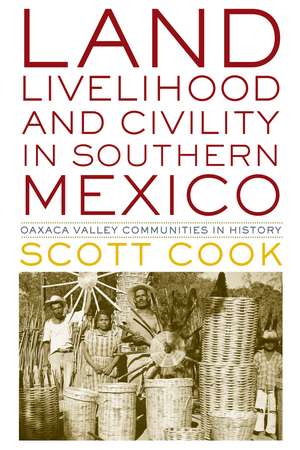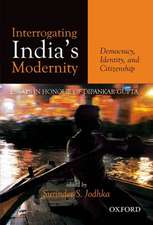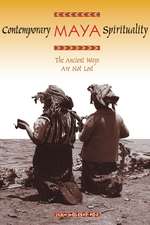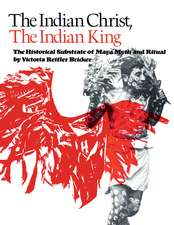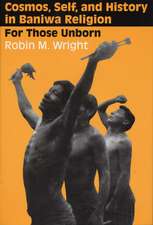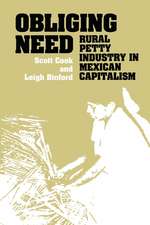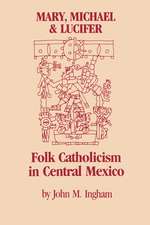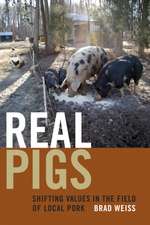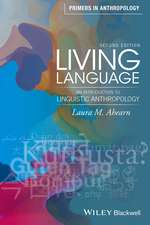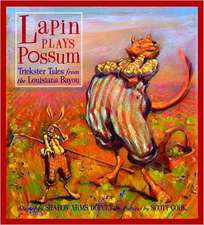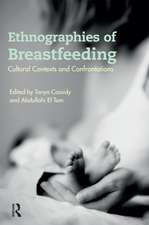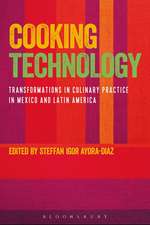Land, Livelihood, and Civility in Southern Mexico: Oaxaca Valley Communities in History
Autor Scott Cooken Limba Engleză Paperback – 15 mai 2014
Drawing on an extensive database that he accumulated through participant observation, household surveys, interviews, case studies, and archival work in more than twenty Oaxacan communities, Cook documents and explains how peasant-artisan villagers in the Oaxaca Valley have endeavored over centuries to secure and/or defend land, worked and negotiated to subsist and earn a living, and striven to meet expectations and obligations of local citizenship. His findings identify elements and processes that operate across communities or distinguish some from others. They also underscore the fact that landholding is crucial for the sociocultural life of the valley. Without land for agriculture and resource extraction, occupational options are restricted, livelihood is precarious and contingent, and civility is jeopardized.
Preț: 305.06 lei
Nou
Puncte Express: 458
Preț estimativ în valută:
58.38€ • 62.42$ • 48.67£
58.38€ • 62.42$ • 48.67£
Carte tipărită la comandă
Livrare economică 18 aprilie-02 mai
Preluare comenzi: 021 569.72.76
Specificații
ISBN-13: 9780292772526
ISBN-10: 0292772521
Pagini: 403
Dimensiuni: 152 x 229 x 25 mm
Greutate: 0.59 kg
Editura: University of Texas Press
Colecția University of Texas Press
ISBN-10: 0292772521
Pagini: 403
Dimensiuni: 152 x 229 x 25 mm
Greutate: 0.59 kg
Editura: University of Texas Press
Colecția University of Texas Press
Notă biografică
Scott Cook is Professor Emeritus of Anthropology at the University of Connecticut, where he also directed the Center for Latin American and Caribbean Studies and the Puerto Rican/Latino Studies Institute. His seven previous books include Markets in Oaxaca, Obliging Need: Rural Petty Industry in Mexican Capitalism, and Understanding Commodity Cultures: Explorations in Economic Anthropology with Case Studies from Mexico. He lives in San Marcos, Texas.
Cuprins
- List of Maps and Tables
- Preface
- Acknowledgments
- Introduction
- 1. The Teitipac Communities: Peasant-Artisans on the Hacienda’s Periphery
- 2. Hacienda San Antonio Buenavista from Two Perspectives: Hacendado and Terrazguero
- 3. San Juan Teitipac: Metateros Here and There
- 4. San Sebastián Teitipac: Metateros and Civility
- 5. San Lorenzo Albarradas, Xaagá, and the Hacienda Regime
- 6. "Castellanos" as Plaiters and Weavers: San Lorenzo Albarradas and Xaagá
- 7. The Jalieza Communities: Peasant-Artisans with Mixed Crafts
- 8. Santa Cecilia Jalieza: Defending Homeland in Hostile Surroundings
- 9. Magdalena Ocotlán: From Terrazgueros to Artisanal Ejidatarios
- 10. Magdalena’s Metateros: Servants of the Saints and the Market
- 11. Conclusion
- Photo Essay
- Glossary
- Notes
- Bibliography
- Index
Recenzii
Provides one of the most thorough accounts of Central Oaxaca’s modern political and economic system. Cook skillfully weaves together archaeological, historical, and his own ethnographic data. . . . Although it will be required reading for any scholar of Oaxaca, Cook’s comprehensive work is an invaluable contribution to the study of the social relations embedded in Mexican and Latin American rural economies.
This volume is a testimony to the lasting influences of social practices that anchor households to a territory that is historically and culturally constituted as a single entity, even when repeatedly crisscrossed by migration flows, contested national policies, and neoliberal reforms. . . . This book will be an illuminating experience for advanced undergraduate and professional readers interested in peasant survival strategies, agrarian struggles, and the social and economic anthropology of Meixco and Latin America.
Descriere
Based on thirty-five years of fieldwork, this is a masterful ethnographic historical account of the struggle to maintain landholding, livelihood, and civil-religious society in the peasant-artisan communities of Oaxaca from colonial times to the present.
